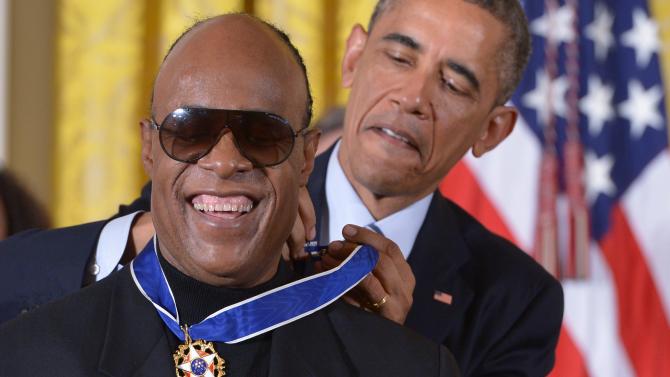
In the midst of his successful Songs in the Key of Life tour, Stevie Wonder, the legendary singer-songwriter who brought us such hits as “Isn’t She Lovely?” “Signed, Sealed, Delivered,” “Living in the City” and “Superstition,” was one of 18 recipients of the Presidential Medal of Freedom on Monday.
The prestigious award, the nation’s highest civilian honor, is given to those who have made significant contributions to society. Other recipients Monday included actress Meryl Streep; African-American professional golfer Charles Sifford; the late dancer and choreographer Alvin Ailey; and civil rights workers Michael Schwerner, Andrew Goodman and James Chaney, who were murdered during Mississippi Freedom Summer in 1964.
President Barack Obama, who presented the awards during a ceremony in the East Room of the White House, described Wonder as one of the most influential musicians in American history, saying that his music has messages of hope and healing and speaks of “love and loss, justice and equality, war and peace.”
“But what really defines Stevie’s music is the warmth and humanity that resonate in every note,” said the president. “Some of his songs helped us to fall in love. Others mended our hearts. Some motivated us on the campaign trail. And thanks to Stevie, all of us have been moved to higher ground.”
After the ceremony, Wonder spoke to reporters:
On how it feels to be awarded the Presidential Medal of Freedom:
Stevie Wonder: I feel truly honored to receive this wonderful Medal of Freedom. My receiving it is saying to me, by the president, be forever committed to this that you’ve started, continue to try your best to encourage people to reach higher ground. … But it is also a statement to me that says this is something that you’re wearing that says you’re committed for the rest of your life to fighting for the freedom of other people—freedom where race is not an issue, where everyone is respected as a family. The freedom of accessibility for those who have disabilities, that there’s nowhere in the world that they can’t be able to go and have a way of it being accessible for them. Freedom for health care, I feel that we need to have health care in this country. We have to have education. There’s no reason for illiteracy anywhere in this country or in the world.
So anything that people are not free to be able to do and be appreciated and recognized, to think that in 2014 that we still have a condition where a person’s color is treated with disrespect and not being honored. We’re all made from the same creator.
On Ferguson, Mo.:
SW: Everyone has to be accountable for the things that they do. I don’t care if they’re a citizen or a police officer. You have to be accountable for what you do. And if you made a mistake, you have to be accountable for that mistake. I don’t believe in violence by anyone.
On fellow recipient Charlie Sifford, who faced extreme racism:
SW: I never realized as much as I have in my recent life that being blind is a blessing. And when I say that, I mean that the reality is I’m able to see someone for themselves, the spirit, and not look in their faces and don’t like this person because of how they look or their color. I’m not saying everyone should poke their eyes out, but I’m saying people should use the consciousness of their heart. And I feel honored that he [Sifford] is being honored. The indignities that happened—of course I feel that they were wrong—and those that people are experiencing today still are wrong, and we have to understand that everything that we are doing, remember that God is watching you.
On achieving your dreams:
SW: There is nothing that you can’t do. If you believe that you can, than you will. So don’t waste your energies believing that you can’t or you don’t or you’re not deserving of. If you’re committed to working for it, to giving the very best of yourself, it can be achieved. I never imagined that I would receive the Medal of Freedom, but I didn’t believe it was impossible. There were those who used to ask me, “Do you think there will ever be an African-American president in America?” I said, “Of course, why not?” There will be a woman president at some point. There’s nothing impossible, but I think the first place it starts with is believing and knowing. … The positive is what’s always possible, and the negative is nonexistent.















